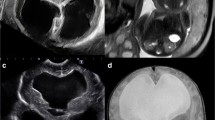Abstract
Purpose
We evaluated the postnatal outcomes of patients with prenatally diagnosed agenesis of the corpus callosum (ACC), in conjunction with ventriculomegaly, as a tool for parental counseling.
Materials and methods
Through a retrospective review of maternal and infant records, we evaluated the postnatal outcomes of 21 patients with prenatally diagnosed ACC and fetal ventriculomegaly.
Results
Ten of the 21 patients (48 %) were diagnosed with isolated ACC. Among these 10 patients, neurodevelopmental outcomes were normal in four, uncertain in one, and five demonstrated mild or moderate disabilities. The remaining 11 patients had ACC associated with either central nervous system (CNS) anomalies (7 of 11) or chromosomal abnormalities (4 of 11). The outcomes were estimated in nine of the 11 children; all nine had severe disabilities. The mortality rate of ACC, associated with other anomalies, was 29 % (2 of 7) in children with CNS anomalies and 75 % (3 of 4) for those with chromosomal abnormalities.
Conclusion
If ACC with fetal ventriculomegaly is associated with other malformations, a poor outcome is highly likely. Although the outcome of isolated ACC with fetal ventriculomegaly was generally better, >50 % of the patients had mild or moderate neurodevelopmental disabilities. These findings provide useful information for parental counseling.
Similar content being viewed by others
References
d’Ercole C, Girard N, Cravello L, Boubli L, Potier A, Raybaud C, Blanc B (1998) Prenatal diagnosis of fetal corpus callosum agenesis by ultrasonography and magnetic resonance imaging. Prenat Diagn 18:247–253
Grogono JL (1968) Children with agenesis of the corpus callosum. Dev Med Child Neurol 10:613–616
Jeret JS, Serur D, Wisniewski K, Fisch C (1985–1986) Frequency of agenesis of the corpus callosum in the developmentally disabled population as determined by computerised tomography. Pediatr Neurosci 12:101–103
Gupta JK, Lilford RJ (1995) Assessment and management of fetal agenesis of the corpus callosum. Prenat Diagn 15:301–312
Francesco P, Maria-Edgarda B, Giovanni P, Dandolo G, Giulio B (2006) Prenatal diagnosis of agenesis of corpus callosum: what is the neurodevelopmental outcome? Pediatr Int 48:298–304
Chadie A, Radi S, Trestard L, Charollais A, Eurin D, Verspyck E, Marret S (2008) Neurodevelopmental outcome in prenatally diagnosed isolated agenesis of the corpus callosum. Acta Paediatr 97:420–424
Fratelli N, Papageorghiou AT, Prefumo F, Bakalis S, Homfray T, Thilaganathan B (2007) Outcome of prenatally diagnosed agenesis of the corpus callosum. Prenat Diagn 27:512–517
Ramelli GP, Zanda N, Wyttenbach M, Bronz L, Schnider A (2006) The prognosis of agenesis of the corpus callosum might mostly be favourable. Swiss Med Wkly 136:404–405
Goodyear PW, Bannister CM, Russell S, Rimmer S (2001) Outcome in prenatally diagnosed fetal agenesis of the corpus callosum. Fetal Diag Ther 16:139–145
Mangione R, Fries N, Godard P, Capron C, Mirlesse V, Lacombe D, Duyme M (2011) Neurodevelopmental outcome following prenatal diagnosis of an isolated anomaly of the corpus callosum. Ultrasound Obstet Gynecol 37:290–295
Li Y, Estroff JA, Khwaja O, Mehta TS, Poussaint TY, Robson CD, Feldman HA, Ware J, Levine D (2012) Callosal dysgenesis in fetuses with ventriculomegaly: levels of agreement between imaging modalities and postnatal outcome. Ultrasound Obstet Gynecol 40:522–529
Santo S, D’Antonio F, Homfray T, Rich P, Pilu G, Bhide A, Thilaganathan B, Papageorghiou AT (2012) Counseling in fetal medicine: agenesis of the corpus callosum. Ultrasound Obstet Gynecol 40:513–521
Moutard ML, Kieffer V, Feingold J, Kieffer F, Lewin F, Adamsbaum C, Gelot A, Campistol I, Plana J, van Bogaert P, Andre M, Ponsot G (2003) Agenesis of corpus callosum: prenatal diagnosis and prognosis. Childs Nerv Syst 19:471–476
Acknowledgments
This study was not supported by any grants.
Conflict of interest
The authors do not have conflict of interests to disclose.
Author information
Authors and Affiliations
Corresponding author
Rights and permissions
About this article
Cite this article
Noguchi, R., Abe, K., Hamada, H. et al. Outcomes of patients with prenatally diagnosed agenesis of the corpus callosum in conjunction with ventriculomegaly. Arch Gynecol Obstet 290, 237–242 (2014). https://doi.org/10.1007/s00404-014-3196-6
Received:
Accepted:
Published:
Issue Date:
DOI: https://doi.org/10.1007/s00404-014-3196-6




